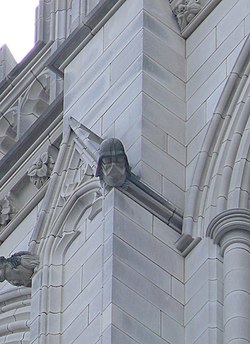
George Lucas's epic space opera multi-film Star Wars saga has had a significant impact on modern popular culture. Star Wars references are deeply embedded in popular culture;[1] references to the main characters and themes of Star Wars are casually made in many English-speaking countries with the assumption that others will understand the reference. Darth Vader has become an iconic villain, while characters such as Luke Skywalker, Han Solo, Princess Leia, Chewbacca, C-3PO and R2-D2 have all become widely recognized characters around the world. Phrases such as "evil empire", "May the Force be with you", "Jedi mind trick" and "I am your father" have become part of the popular lexicon.[2] The first Star Wars film in 1977 was a cultural unifier,[3] enjoyed by a wide spectrum of people.[4]
Many efforts produced in the science fiction genre (particularly in filming) can now be seen to draw heavy influence and inspiration from the original Star Wars trilogy, as well as the magnitude of sequels, spin-offs, series, games, and texts that it spawned. Sounds, visuals, and even the iconic score of the films have become integral components in American society. The film helped launch the science fiction boom of the late 1970s and early 1980s, making science fiction films a blockbuster genre.[5] This impact also made it a prime target for parody works and homages, with popular examples including Spaceballs, Family Guy's Laugh It Up, Fuzzball trilogy of specials, Seth Green's "Robot Chicken: Star Wars", Steve Oedekerk's "Thumb Wars", and Lucas's self-proclaimed favorite parody, Hardware Wars by Ernie Fosselius.
- ^ Brooker, Will (2002). Using the Force: Creativity, Community, and Star Wars Fans. New York [u.a.]: Continuum. ISBN 0-8264-5287-6.
- ^ "The power of the dark side". Chicago Tribune. May 8, 2005. Archived from the original on May 22, 2011. Retrieved June 13, 2016.
- ^ Emerson, Jim (2007). "How Star Wars Shook The World". MSN Movies. Archived from the original on June 3, 2008. Retrieved December 1, 2015.
- ^ "Online NewsHour: The Impact of the Star Wars Trilogy Films – May 19, 2005". Archived from the original on November 17, 2007. Retrieved June 13, 2016.
- ^ Cook, David A. (2000). Lost Illusions: American Cinema in the Shadow of Watergate and Vietnam, 1970–1979 (1st paperback print. ed.). Berkeley: University of California Press. ISBN 0-520-23265-8.[page needed]
